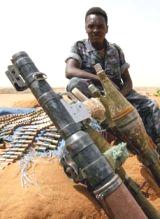Sudanese army may be reading for Darfur attack -UN
Septr 8, 2006 (GENEVA) — Worsening violence in Sudan’s conflict-ravaged region of Darfur is threatening the entire region, the U.N. refugee chief said Friday, warning that Sudanese troops could be preparing for a major military offensive that would lead to many more people being uprooted from their homes.
 “Millions of people are already at grave risk,” Antonio Guterres, the U.N. high commissioner for refugees, said in a statement. “Hundreds are still dying amid ongoing violence, and thousands are still being forcibly displaced.”
“Millions of people are already at grave risk,” Antonio Guterres, the U.N. high commissioner for refugees, said in a statement. “Hundreds are still dying amid ongoing violence, and thousands are still being forcibly displaced.”
Guterres, citing the poor security situation in Darfur and the uncertainty over whether a U.N. peacekeeping force will be deployed to the region, said, “A bad situation is worsening by the day.”
On Aug. 28, Sudanese government forces launched a major offensive believed to involve thousands of troops backed by bomber aircraft and helicopter gunships in a bid to flush out rebel strongholds in Darfur.
Guterres’ statement noted the danger of a government offensive that could lead to the displacement of even more people in Darfur, and said the violence, which has increased since a May peace deal signed by the government and the region’s largest rebel group, threatened other countries nearby.
In neighboring Chad, where UNHCR camps house more than 200,000 Darfur refugees, cross-border violence has at times been so bad that it has sent some Chadians fleeing into Darfur, he noted. He said the Central African Republic, southwest of Sudan, also was threatened with increased instability by the Darfur conflict.
“Urgent international action is needed to put pressure on the parties to the conflict and to convince everyone involved on the ground to let humanitarian agencies safely carry out their work,” he said. “Lives depend on it. If things don’t improve, we’re heading for a major catastrophe.”
More than 200,000 have been killed in the region since 2003, when ethnic African tribes revolted against the Arab-led Khartoum government. Fighting has caused another 2.5 million people to flee their homes.
A peace deal, signed in Nigeria, was supposed to help end the conflict, but instead has triggered months of fighting between factions of the Sudan Liberation Army. The U.N. has reported continued attacks by armed militias on villages, and has cited evidence that government forces have been complicit in some.
UNHCR spokesman Ron Redmond told reporters that there recently have been “disturbing reports” of rapes and killings in Darfur. He added that the insecurity as well as ongoing attacks on U.N. and other aid workers was threatening the agency’s ability to act as “the international eyes and ears on the ground.”
Jose Diaz, spokesman for U.N. human rights chief Louise Arbour, added that civilians living particularly in Darfur’s rebel-controlled areas continue to be exposed to abuses, “either as a result of indiscriminate attacks or as a result of getting in the middle of clashes between warring parties.”
He said U.N. monitors have documented a number of attacks on villages, such as a series of rebel incursions in the south Darfur locality of Buram he described as “the most serious since the signing of the Darfur Peace Agreement.” Reports indicate that 38 people were killed and 23 injured in the attacks on 10 Buram villages Aug. 28-31, Diaz said.
On Wednesday, the New York-based rights group Human Rights Watch said the Sudanese government was indiscriminately bombing civilian-occupied villages in Darfur.
It said sources report flight crews rolling bombs out the back ramps of aircraft, a means of targeting rebels that was often practiced by government forces in its separate 21-year civil war with rebels in southern Sudan.
An understaffed and cash-starved African Union force of 7,000 peacekeeping troops has been unable to halt the violence in Darfur, a vast region the size of France, since the conflict began three years ago.
The African Union has asked for the U.N. to take control of the peacekeeping force, whose formal mandate expires on Sept. 30.
But Sudan has rejected U.N. plans to take over the mission and said this week it would expel the African Union peacekeepers if they insist on transferring their mission to the U.N.
(AP/ST)
